2021 Pivot Firebird Pro XT/XTR Coil with Alloy Wheels
(discontinued)
| Where To Buy | |||
|---|---|---|---|
Free shipping on orders over $50 (continental U.S. only).
International shipping available. Some exclusions apply. |
|||
Free shipping on orders over $50 (continental U.S. only).
International shipping available. Some exclusions apply. |
|||
After the launch of its Switchblade model, Pivot has been working through the rest of the line. Updates include a new vertical shock layout and revised geometry. The Firebird is the latest to get the revision and Pivot did not hold any punches here. Not one of the best kept secrets out there, when the Firebird did finally land, we were pleased as punch to have one in our studio.

Strengths
| Weaknesses
|
Highlights
- Full carbon frame
- 29-inch wheels
- 165mm (6.5-inches) of rear wheel travel // 170mm (6.7-inches) fork travel
- DW Link suspension design
- 1.5 straight headtube (tapered steerer)
- Internal cable routing
- FOX Live Valve capable
- Mounts on the top tube and downtube for Tool Dock
- Size-specific chainstay lengths
- Molded, rubber frame protection throughout
- PF92 Press-fit bottom bracket with ISCG05 mounts
- Super Boost+ 157 rear spacing with 12mm through axle
- Universal Derailleur Hanger
- Measured weight (size medium, no pedals): 32 pounds (14.5kg)
- MSRP $7,799 USD (Pro XT, Coil, Alloy Wheels)

Overview
Sporting a 468mm reach, the Pivot Firebird had the longest front-center in our test. To keep the overall length in check, the chainstay is 434mm with a 64-degree head angle for a total wheelbase of 1239mm. Riders will want to check the geometry chart below, in the original release, to see what these numbers look like in different sizes as Pivot is doing size-specific chainstay lengths with the Firebird.
With 165mm of coil-sprung rear travel and both ends of the bike adorned by FOX Factory suspension, the Firebird is properly equipped for serious hits. Overall, the build kit is ready for action. 4-piston Shimano XT brakes with 203mm rotors indicate this bike is built for speed. Our test bike had a 175mm FOX Factory Transfer dropper post. With plenty of post-insertion, we were big fans of this post's performance and fit. Cheers to Pivot for putting a long dropper on a medium.



The drivetrain on our bike features a Shimano XT 12-speed cassette and shifter with an XTR derailleur. The cranks are Race Face AEffect R, budget-minded but they get the job done. Pivot supplies their house carbon bar and alloy stem. The bars showed up pre-cut to 760mm width and the stem was 50mm long. More on that later. Grips are one of those personal things and more often than not, we wind up not liking the stock ones. We did enjoy the Phoenix Factory lock-ons supplied though. They have a nice, soft feel without creating too much of a wandering feeling.

Rider Setup
Our testing team fussed with their settings during testing. The numbers below represent where they settled in the end.Compression clicks all started at the factory recommended settings and moved on from there. For simplicity sake, here are the highlight numbers that each tester used.
Casey Coffman
| Andrea Napoli
| Ryan Lummis
| Brad Howell
|
On the Trail
Our only other parts gripe actually proved to be the Firebird's undoing for two of our testers. Pivot's house brand 45mm stem was 10mm longer than any other bike in our test. Relatively speaking, a 45mm stem is considered "long" for bikes in this category. Taking into account the big reach on the Firebird and you have a bike with a forward weight bias. Our bars came pre-cut at 760mm, 10mm narrower than the narrowest bars in the test. These two elements combined had two of our testers feeling uncomfortable out of the gate. It should be noted that all bikes are shipped to shops with an uncut, 800mm bar and a shorter, 35mm stem is available. Seemingly there was a mixup and our bars were trimmed too much.

One of our test trails starts with an incredibly steep and technical descent. Terrain of this sort is on the very fringe of where these bikes will get ridden, but, they will get ridden in such areas. Far and away, the Firebird struggled the most here. Riders found themselves getting pushed over the front and fighting to keep the Firebird on its line. In an attempt to keep the front higher, our testers added air to the fork and put another 10mm spacer under the stem. Neither was enough to save the bike, and the riders, from getting bucked in the steep rocks.

Once the trail leveled out a bit, the Firebird lit up for our testers. When it came to high-speed trails that are more in the mainstream of what mountain bikers encounter, the Firebird took off like a bat out of Hell. Midway through testing, one of our riders changed his stance on the Firebird. Initially, he was borderline sketched out by the bike. Once lunchtime came around, he was hauling the mail and boosting lips. It would seem that for some, the Firebird was just not a fast read. Once accustomed though, we were very big fans of this enduro bike's ability to gobble the chunk at speed.




On the more mainstream trails, the Firebird's DW suspension did a good job of staying composed. In sections were other bikes would beat up testers, the Pivot responded well. Notably, bomb holes and loose rocks leading into corners did not upset the Firebird and allowed it to nail the intended line. It was these flashes of brilliance that had some of our testers coming back for more and begging the question of how this bike would perform with a more appropriate cockpit.
When it came to fit, most of us found the Firebird to be rather comfortable. Other than the narrow-ish bars and long-ish stem, sitting and pedaling the Firebird was a welcomed affair. The Firebird is properly efficient, even with a coil, and the body positioning lent itself to all-day riding. One of the more efficient bikes, we could see the Firebird being an excellent go-to for mountain bikers with access to big rides in rough terrain.

Three of our testers found the Firebird to be lively on the trail. Pushing into the Firebird gave positive output in pumping trail features and popping lips. We would not call the Firebird snappy, but it's far from a slug. Our lightest tester found the Firebird to be less playful and more planted, ready for action. Regardless of how we felt toward the Firebird, we could all agree this was a bike that scooted down the trail with great speed.


Build Kit
There are plenty of complaints out there about the wandering bite point on Shimano XT brakes. We'll not be adding to the list today. Our XT brakes with their 203mm rotors were an absolute dream. Given how well the Firebird can carry speed, we were happy to have these powerhouses on board. With that said, the occasional pad rattle did make itself known, in particular to the rider behind the Firebird. Oh well, with performance this good, we'll take it.

DT Swiss XM1700 wheels are a solid set of all-mountain alloy hoops. They rolled fast and engagement on the 350 hubs was great. We have no doubt they are part of the reason the Firebird rolls so well. They did suffer a small dent prior to Test Sessions. At the time, the dent was enough to make the rear tire lose air and have us limp home with a tube. We were able to get the tire to reseat and hold air once home. During our time in Reno, the XM1700s held their own and took no further damage.

Half of the bikes that showed for Test Session had heavier duty tires that enduro bikes often demand. Two of those with lighter tires can be customized from the brand with burly rubber. This leaves the Firebird as the lone bike coming with EXO+ tires instead of the DoubleDown construction is deserves. Did we have any slashes or direct issues? No. Should riders consider more burly rubber? If you're taking the Firebird to the limit, we think yes.

Test Sessions Take
We anticipated the Firebird showing up to Test Sessions and cleaning house. It was a surprise that our team was so divided on the centerline of where this bike did and did not perform. All four testers did note that uber-steep, technical lines were outside of the Firebird's comfort zone. While many bikes will not get into this turf, the Firebird did stick out as the lone passenger on the struggle bus. Truly, unless big slabs and heavy lines are on your agenda, there's a lot to love about the Firebird. Bike park aficionados and back-country explorers will love the Firebird's efficiency and ability to tame the rough stuff. Enduro racers (like who helped develop this bike) will want to give the Firebird a look as well.
We have an update on our Pivot Firebird review.
After examining our tester's feedback and some of the peculiarities with the Firebird, we knew the test wasn't over. We reached out to Pivot and asked for a new bar and stem because the longish stem and narrowly cut bars flew in the face of the Firebird's intended use.Happily, they obliged.
Additionally, we had a conversation with Pivot about suspension setup and tuning, just to make sure we were hitting the mark. Vital has been testing bikes for over a decade, but we stay on top of our game by being thorough. All four of our testers used the FOX setup guide printed on the 38's lowers. Interestingly, this is a firmer setup than what Pivot recommends per their site. We spoke to Pivot about this and were given the go-ahead to run the fork stiff for steep terrain. This was a good thing since what our riders were experiencing would possibly be remedied with a firmer setup. This was double-good since the omniscient YouTube crowd deemed us inept at putting enough air in the Firebird's FOX 38, but not the three other FOX 38 forks in the test.

The bars and stem
After taking receipt of our new 800mm bar and 35mm stem, we noticed something off with the original bars. Despite measuring out to 760mm, they were cut on Pivot's 770mm cut line. When we lined them up to Pivot's 800mm bar, we could see the measuring lines were 10mm off. Comparing the Pivot bars to other brands revealed the same consistency. The original bars on our Firebird were mislabeled. Our new bars measured out to 800mm, and the cut markings on it lined up to the cut markings on other brand's bars. Only the original bars in our test were off the mark.



Typically, an unfortunate mistake like this would be pretty minor. However, when going between six different bikes, having only one set of bars be particularly narrow can make it stand out, causing riders to feel more cramped than they really are. Getting the shorter, 35mm stem proved fruitful because, in addition to having the longest stem in our test, the Pivot also had the longest reach, creating a front end that was far longer than the other five bikes despite all of them being the same "size" (medium).
With our issues addressed, we sent the Firebird back to Reno to be re-tested on the same terrain by one of our Test Session riders, former professional racer, Casey Coffman. Let's break down what changed, and what did not.

More than anything, the suspension tuning on our Firebird was a point of concern. We discussed setup with Pivot and dove deeper into how they feel their bikes should be set up. Typically, they advise riders run their fork softer than what is recommended on the FOX set up guide. They did share that if the rider is very aggressive and riding very steep terrain, a stiffer setup is ok. This was good news since during the original test, Vital was already running the FOX 38 at the recommended FOX setting; stiffer than Pivot's recommendation. Even still, Vital felt the fork may have been too soft, and Casey gave it another crack.

Despite running the fork with an even firmer setting and playing around with reducers, our test rider could not manage to get rid of the Firebird's forward push in the steeper sections of trail. Setup alone won't solve every issue, and Casey found that by riding off the back of the bike, he could mitigate some of this forward push. The tradeoff came when it was time to set up for a corner and Casey found himself with not enough weight on the front end. "Riders should consider a bike that suits their style, not adapting their style to suit a bike," he said in his post-test interview. This would play a role in why some riders may fight harder than others to make the Firebird shine.
This is a bike that makes the case for being over-biked and not being punished for it.
Enough of the problem area. Undoubtedly, after more time on the bike, we have found the Firebird to be a riot in situations where 90% riding happens. Those heading out for big rides will very much appreciate how efficient and capable the Firebird is. This is a bike that makes the case for being over-biked and not being punished for it. With plenty of supple travel to gobble up the bumps, the Firebird won't leave you feeling beat up at the end of a big ride.
We also think that riders heading to the local bike park are really going to have a blast with this bike. Prior to Test Sessions, we had a few days on the chairlift and loved ripping laps. We found the Firebird to deliver a big, confident ride that had us feeling like "one more lap," would be just enough.
Pivot's Firebird is a terrific mountain bike. We love the parts spec on it and found it to be lightning quick in most riding scenarios. A big thanks to Pivot for letting us dig deeper with this orange rocket. We enjoyed the chance to go deeper with the Firebird and hope our readers found it valuable as well.

Head here to catch the full 2021 Enduro Test Session Feature
Learn more about the Pivot Firebird, head to PivotCycles.com

Even though the all-new Pivot Firebird was just launched, chances are, this bike looks pretty familiar at this point. Pivot's teasers for the new orange enduro bike have been plenty revealing. Today, Pivot Cycles confirms that yes, this is the all-new Firebird 29. Pivot factory racers have been running this new bike on the Enduro World Series circuit. It was with their input that the new Firebird 29 was developed and refined to its current rendition. Let's unpack all the updates and details.
Highlights
- Full carbon frame
- 29-inch wheels
- 165mm (6.5-inches) of rear wheel travel // 170mm (6.7-inches) fork travel
- DW Link suspension design
- 1.5 straight headtube (tapered steerer)
- Internal cable routing
- FOX Live Valve capable
- Mounts on the top tube and downtube for Tool Dock
- Size-specific chainstay lengths
- Molded, rubber frame protection throughout
- PF92 Press-fit bottom bracket with ISCG05 mounts
- Super Boost+ 157 rear spacing with 12mm through axle
- Universal Derailleur Hanger
- Measured weight (size medium, no pedals): 32 pounds (14.5kg)
- MSRP $7,499 USD (Pro XT, Coil, Alloy Wheels)
Over the past few seasons, Pivot has been moving through its line, reconfiguring each model to a vertical shock layout, first seen on the Switchblade. The Mach 6 and Trail 429 followed next. It was only natural that we would see the Firebird get the update.
Where the Firebird deviates from the rest of the Pivot line is in the chainstays. The new Firebird 29 now has size-specific chainstays ranging from 431mm on the size small all the way to 445mm on the x-large frame. Each size has its own length of chainstay.
To learn about the entire Firebird story, get a load of Pivot's new podcast, All About Bikes. Pivot owner, Chris Cocalis, discusses the Firebird lineage and how they've arrived at this point with the bike.


This latest iteration of the Firebird gets more than just a front-end stretch. Much like the models updated prior, the Firebird gets additional mounts on the top and down tubes for Pivot's Tool Dock system (or any system that mounts to a standard bottle boss.) Riders can now store a full-size water bottle inside the front triangle as well. Rear travel also grows a tad, now sporting 165mm of DW Link motion. That suspension travel is a touch more progressive to better suit high-volume air shocks as well as coil shocks.

As with the prior generation, the new Firebird uses a 1.5-inch headtube but does run a standard tapered steerer tube from the factory. Pivot did update the Firebird with a 31.6 diameter seat tube to accommodate longer droppers and keep the frame stiff. With the vertical shock layout, the new Firebird does have a more compact/lower slung frame.



Geometry
The prior generation of the Firebird 29 geometry could pass as modern still by today's standards. The only real fly in the ointment was the standard 431mm chainstay length across all sizes. Nevertheless, the all-new Firebird gets the expected longer-lower-slacker-steeper treatment that many mountain bikes are being handed these days.





Pivot states the mission with this new Firebird was to maximize stability at speed and allow riders at the aggressive end of the spectrum to push even harder. The Firebird has been the bike of choice for EWS riders and while its geometry numbers move in the expected directions, nothing is too wild.
The Firebird maintains its flip-chip which can raise the bottom bracket by 5.8mm and steepen the seat and head tube angles by .6-degrees. Pivot does state that positioning the Firebird in the high position is a good starting point for those wanting to use a mixed-wheel setup (29-inch front, 27.5-inch rear). With the addition of a 17mm lower headset spacer and the flip-chip in the high position, riders can outfit the Firebird to run 27.5-inch wheels. Stock builds will come in 29-inch wheeled options only though. Lastly, while the Firebird is cleared for use with a 180mm travel fork, it is not dual crown compatible.



Pivot ships the Firebird in the low position and describes it as low being the default. All measurements reference this setting. Our size medium test bike has a 468mm reach, probably the one number we would call out as being a bit, "out there." A 64-degree head angle keeps the front stable on those fast descents. The stubby 410mm seat tube length means there is plenty of room for our 175mm FOX Transfer dropper post. Lastly, the 76.5-degree seat angle is calculated based on seat height averages for a given size.



Something we are seeing with more brands now is size-specific chainstay lengths. The new Firebird's chainstay does grow throughout the size range but still runs a tad on the short side, given the bike's longer front end. 431mm used to be the default, now it is the starting point on size smalls. Our medium test bike has 434mm stays and sizes large and x-large bump up to 438mm and 445mm, respectively. Pivot did not want the Firebird to handle like a bus, so they decided to keep the backend relatively short for a touch of Party-Time on the downhills.

The Lineup
Pivot uses three over-arching labels for the sub-builds it offers. No matter where riders land in the spectrum of builds, some parts will remain the same. Tires are the Maxxis Minion DHF/DHRII combo in 2.5 and 2.4-inch widths. Casing is EXO+ in the 3C MaxxTerra compound. Brake rotors will either be 203mm (Shimano) or 200mm (SRAM) front and rear. FOX 38 forks are on all models, with any number of FOX rear shocks suspending the rear. FOX is also on dropper post duty all the way until you get to the AXS-equipped bikes.



Pivot starts with the Race models, of which it offers a Shimano SLX/XT blend for $6,099 and a SRAM GX/X01 blend for $6,699. Both bikes come with a FOX Performance Elite Float X rear shock and FOX Performance 38 fork.

Pivot's Pro line sees many more options get added to the mix. At the base, is the Pro, air shock, alloy wheel build in either a XT/XTR ($7,299) or X01 (GX cassette) for $8,199. Both of these builds feature a FOX Factory 38 fork and FOX Factory X2 rear shock. From here, riders can choose options with carbon wheels and swap out the rear shock to a FOX DHX2 coil. There is even a FOX Live Valve option.

At the final tier are the Team builds with either Shimano XTR ($9,599) or SRAM XX1 AXS ($11,399). The Team builds feature the same FOX Factory suspension options as the Pro lineup. Riders can do carbon wheel options as well as FOX Live Valve. At the top of the heap, in all its electronic glory, is the Pro XX1 AXS, Live, complete with Reynolds Blacklabel wheels for an easy $13,099.

The myriad of options in each level of build can be a bit dizzying, so we recommend grabbing a cup of whatever and scrolling through the Product Guide for yourself. For the purposes of what Vital has in store for the new Firebird, we landed on the Pro XT, Alloy wheel, Coil option. For $7,499 we have a bike with a Shimano XT build (XTR rear derailleur, Race Face AEffect R cranks), complete with 203mm rotors front and back. Our suspension is FOX Factory and uses a 170mm 38 fork with a DHX2 coil in the rear. DT Swiss XM1700 wheels with 350 Star Ratchet hubs handle the rolling bits. The carbon handlebar, stem, and grips are all Pivot's own.

What's The Bottom Line?
We took possession of our Firebird test bike and made haste for the nearest trails. Pivot was kind enough to send us a bike but withheld any geo or spec details, something we very much prefer. We enjoy riding a bike blind and drawing ride impressions prior to seeing any numbers. After the first ride, our two key takeaways from the new Firebird were, "Wow, that's a roomy front end," and just how snappy the back of the bike felt.
After two trail rides, we took the Firebird to the chairlifts for some shooting and initial impressions. We logged numerous laps, infinite braking bumps and hit a few rocks. Our first impression here is that the suspension on this new Pivot Firebird feels buttery smooth. The Firebird seems to have a quality about it that paves over all the small hits and a few of the bomb holes on the trail.
Despite having a long reach, the Firebird does a good job of maintaining front wheel traction on low-angle descents and flat corners. A rider-neutral position seemed natural and delivered a predictable ride. We were very much surprised by how playful and fun the new Firebird is. A big 29er such as this should feel like a barge but the Firebird gave the impression of anything but that.
The real meat of our testing is set to take place in September as part of our Enduro Test Sessions where the Pivot Firebird will face off against five other bikes in this category. We have four unique testers lined up and each of them will surely put the Firebird through the paces.
For now, head to PivotCycles.com to get more of the new Firebird.

Specifications
Upgrade option: Industry Nine Enduro S wheels, 30.5mm, 29"
Upgrade option: Industry Nine Enduro S wheels with Industry Nine 1/1 hub
Upgrade option: Industry Nine Enduro S wheels
Rear: Maxxis Minion DHRII 29" x 2.4" WT/TR/3C/EXO+, MaxxTerra
1 year for frame paint, finish, and bearings
5 years for Pivot Cycles-branded Phoenix Components
Firebird version 3
dw-link suspension with patented position-sensitive anti-squat
Variable chainstay lengths and kinematics for each frame size
Vertical shock layout allows for a more compact frame design that's stiffer, lighter, and has a more centralized, lower center of gravity
Independent strength to weight analysis for each frame achieves consistent performance metrics
Variable tube sizing and custom-tuned carbon lay-up scales stiffness across all sizes
Proprietary ride tuning fits riders from 5'2" to 6'9"+ with frame sizes from Small through XLarge
Progressive shock rate optimized for high volume air shocks and coil applications
Flip chip adjustability with "High" and "Low" settings changing the BB height from 355.8mm to 350mm and steepens the head and seat angles by 0.6 degrees
Pivot Dock Tool System, an on-the-bike tool system created in collaboration with Topeak puts the essentials under the top tube or BB
Dock Tool System available as Dock Ninja CO2, Dock Ninja Tool Box T16+, or Dock Ninja Toll Box Mini 20 Pro
Compatible with mixed-wheel size setup and with 27.5" wheels in the "High" flip-chip setting (needs a 17mm extended headset cup for 27.5" in the front)
The maximum travel length that can be used on the Firebird is 180mm and it's not dual-crown compatible
Uses a SRAM Universal Derailleur Hanger (UDH)
FOX Live Valve integration built into frame
| Where To Buy | |||
|---|---|---|---|
Free shipping on orders over $50 (continental U.S. only).
International shipping available. Some exclusions apply. |
|||
Free shipping on orders over $50 (continental U.S. only).
International shipping available. Some exclusions apply. |
|||




























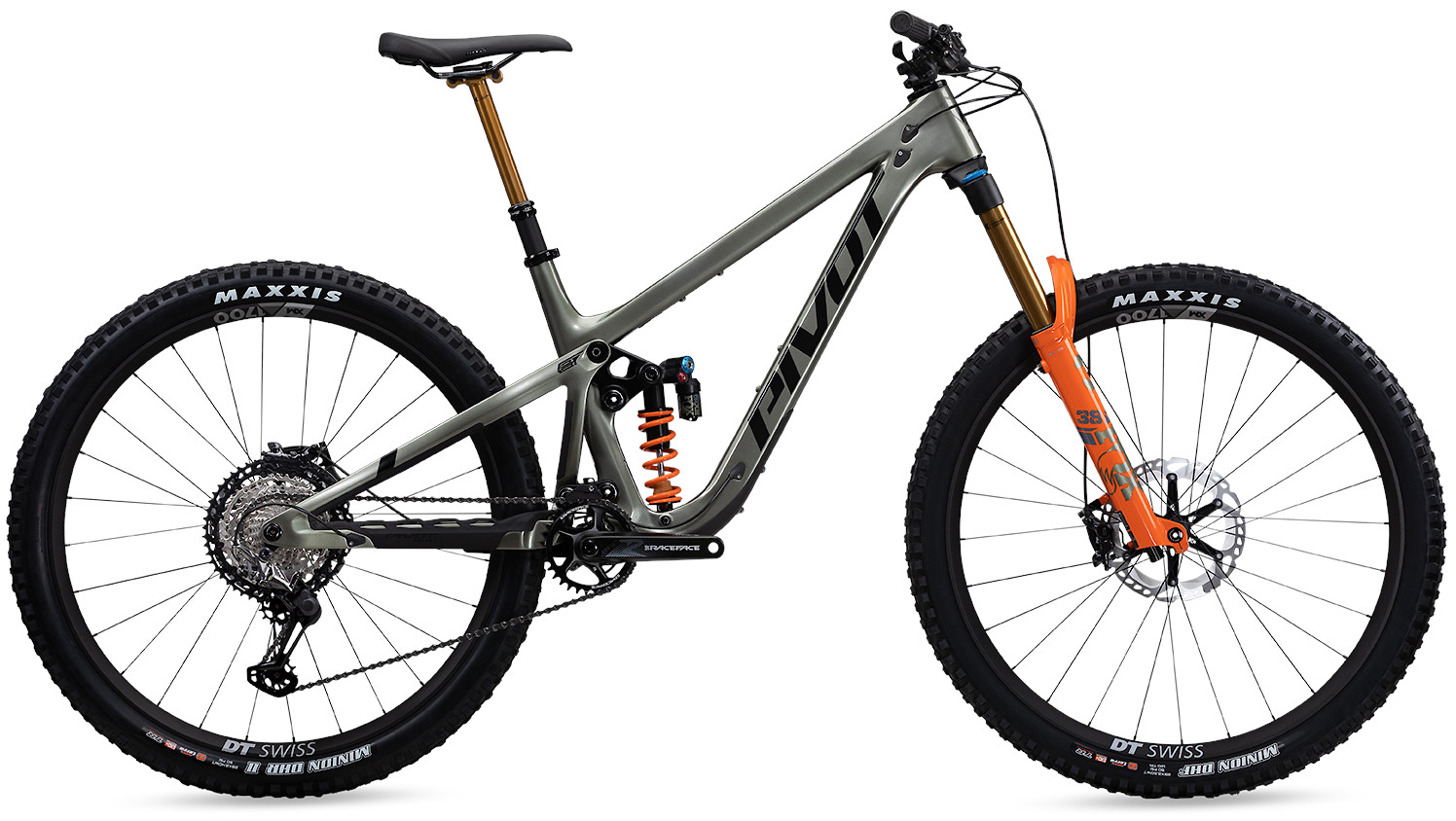
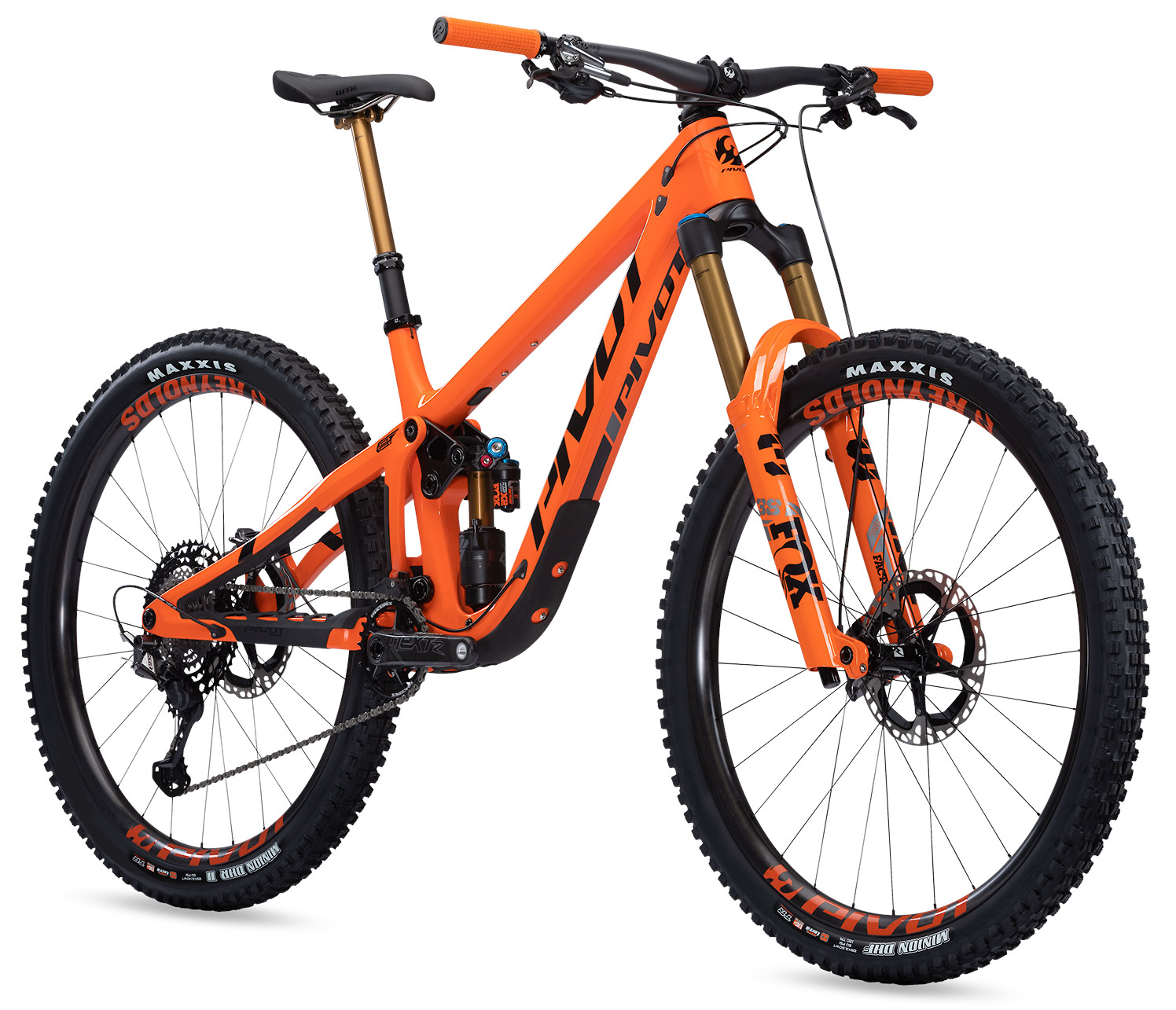
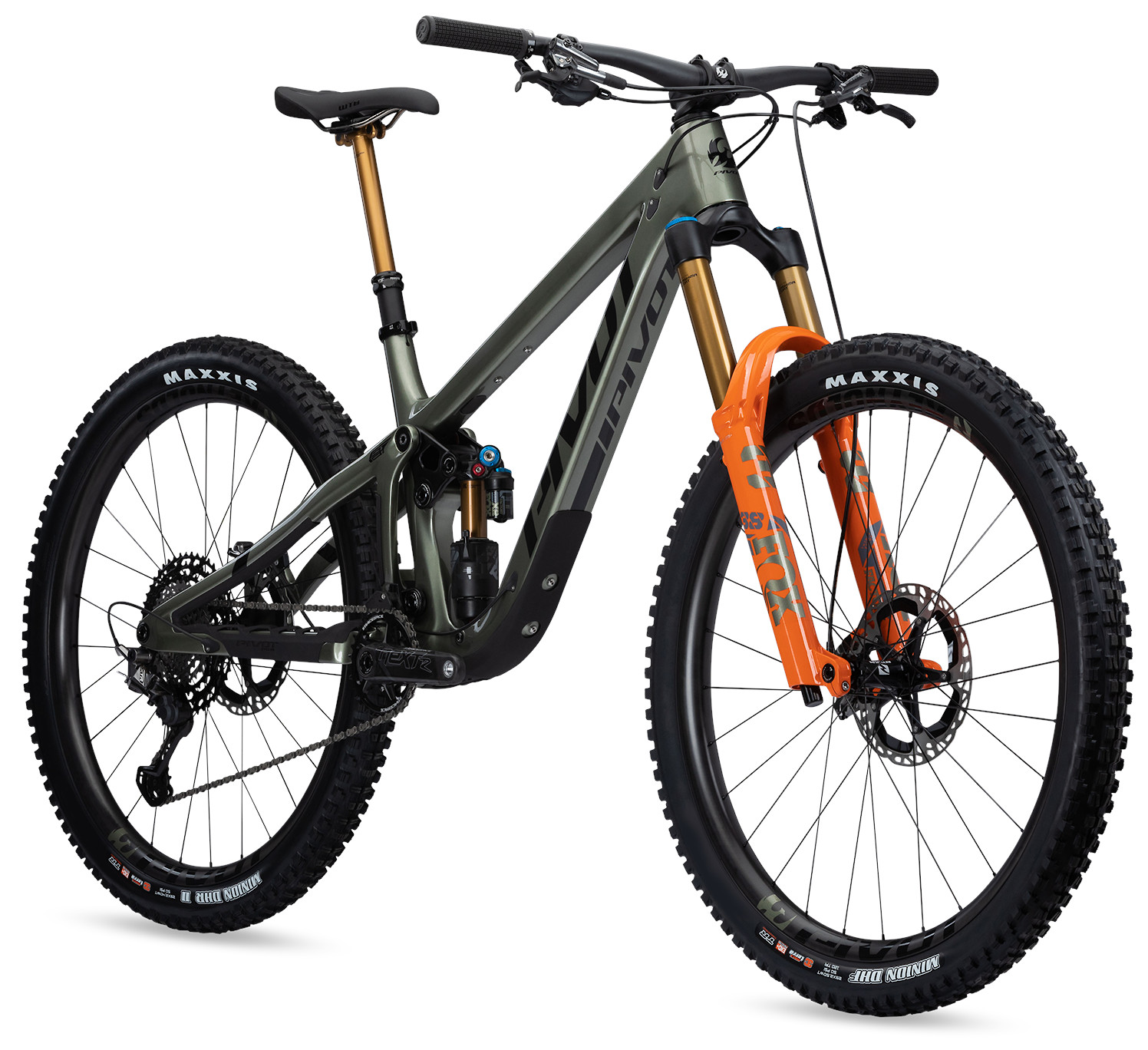
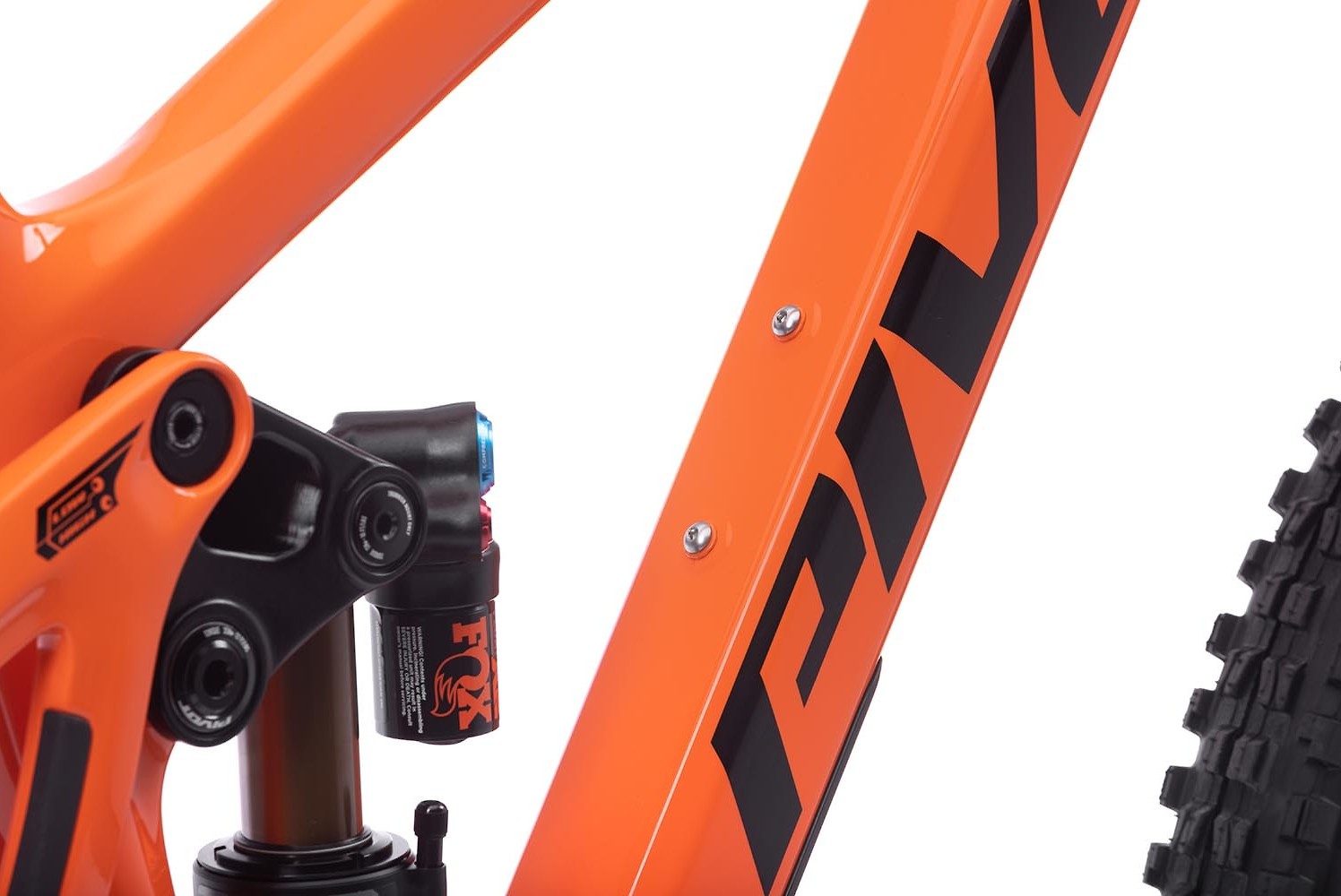



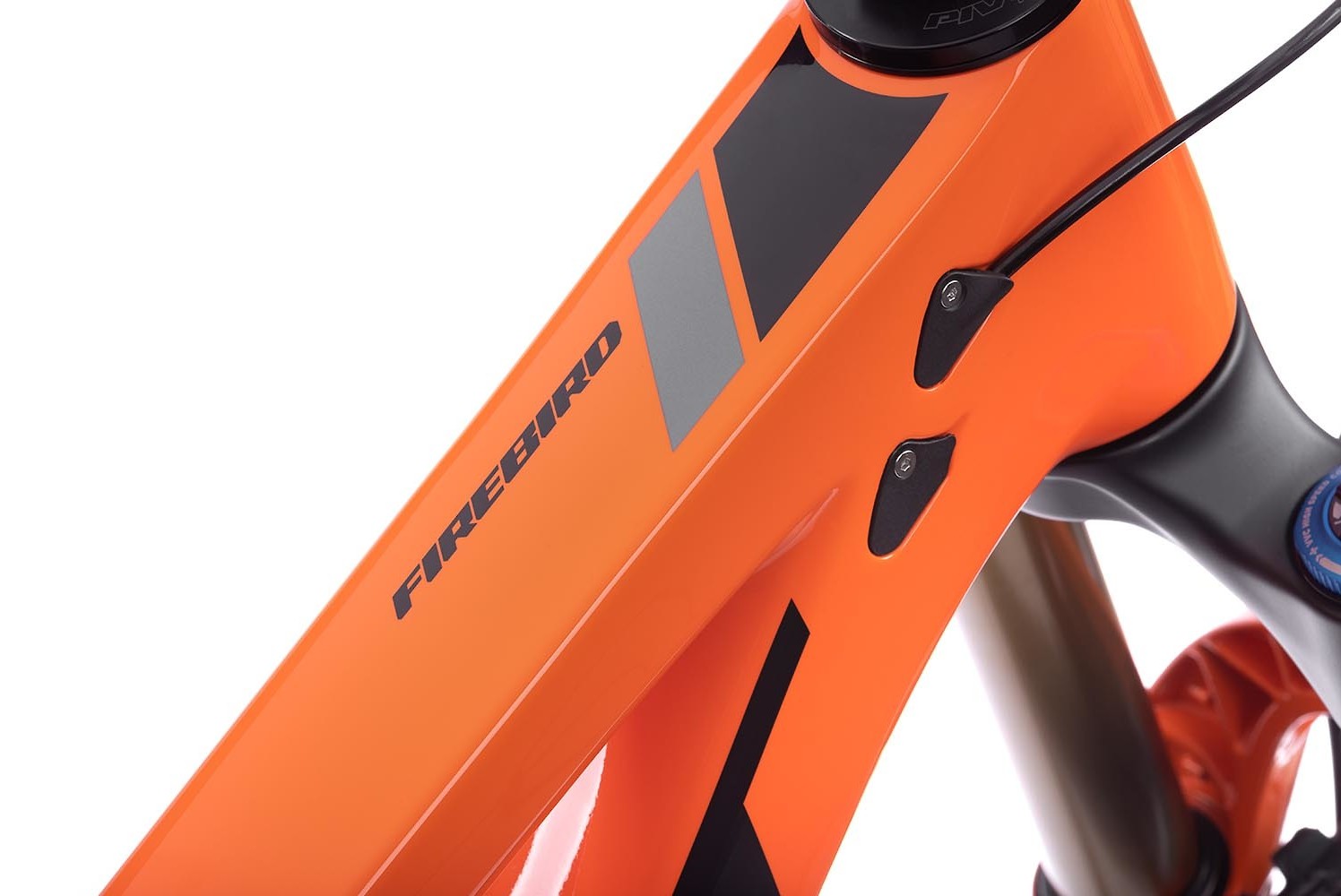
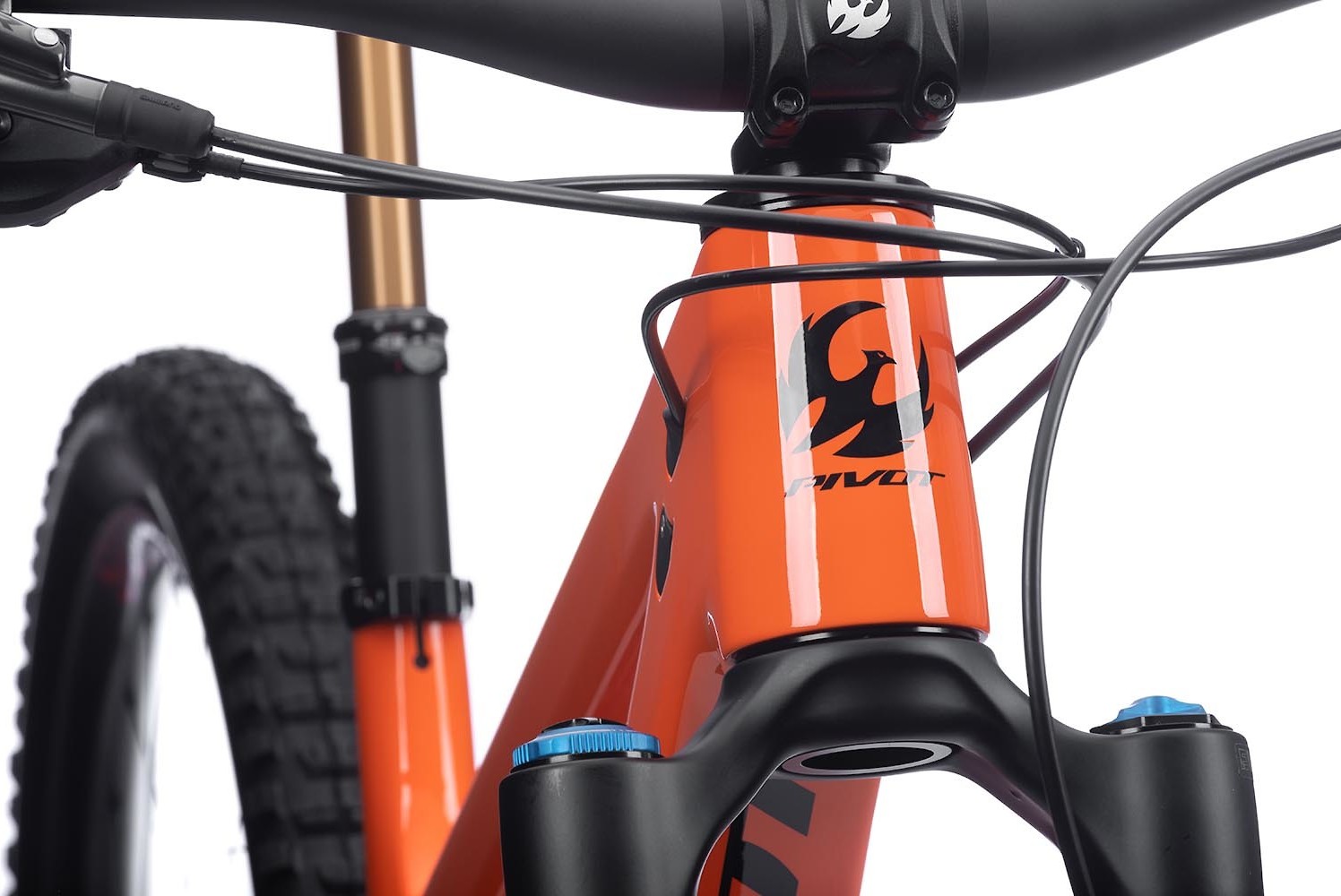


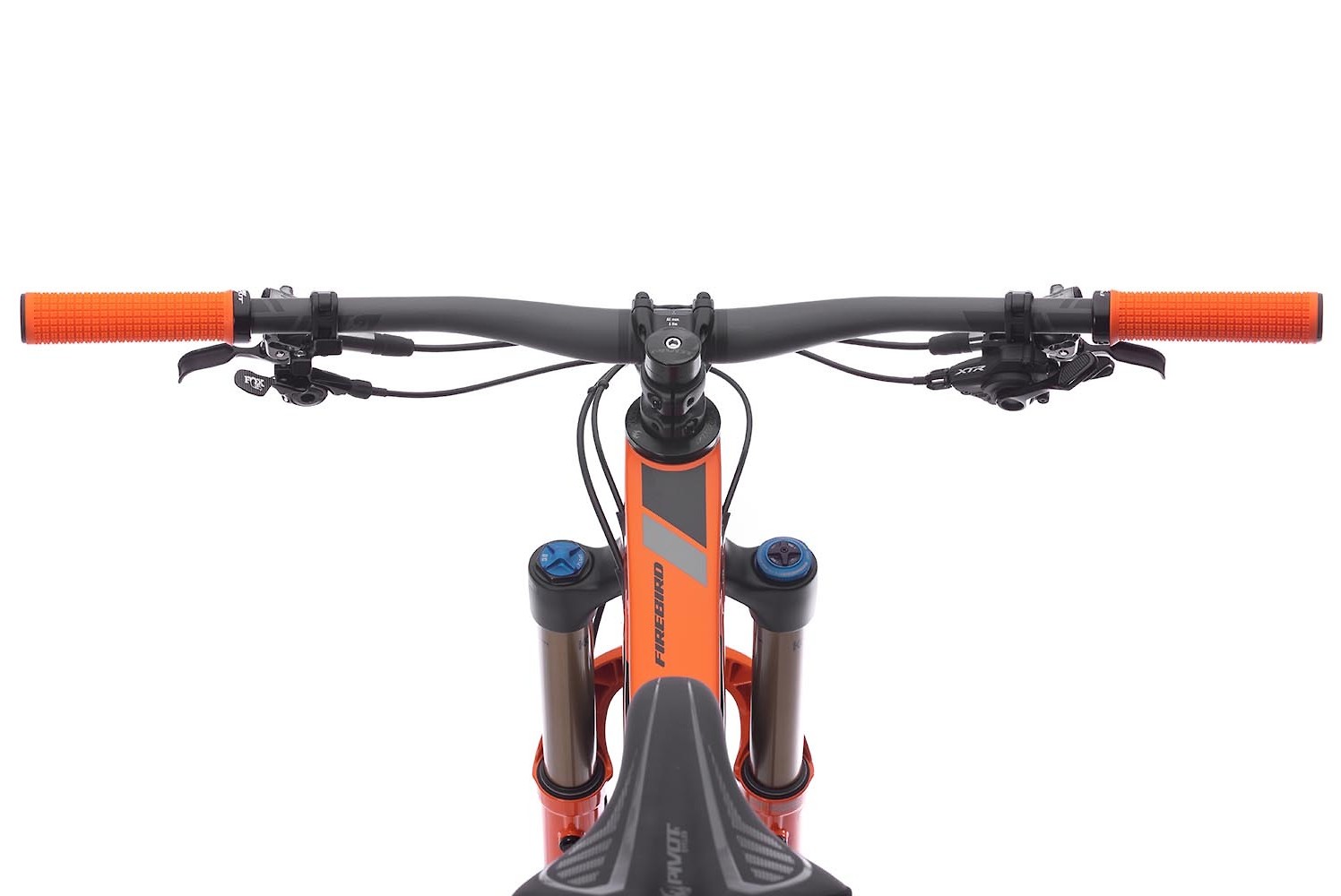

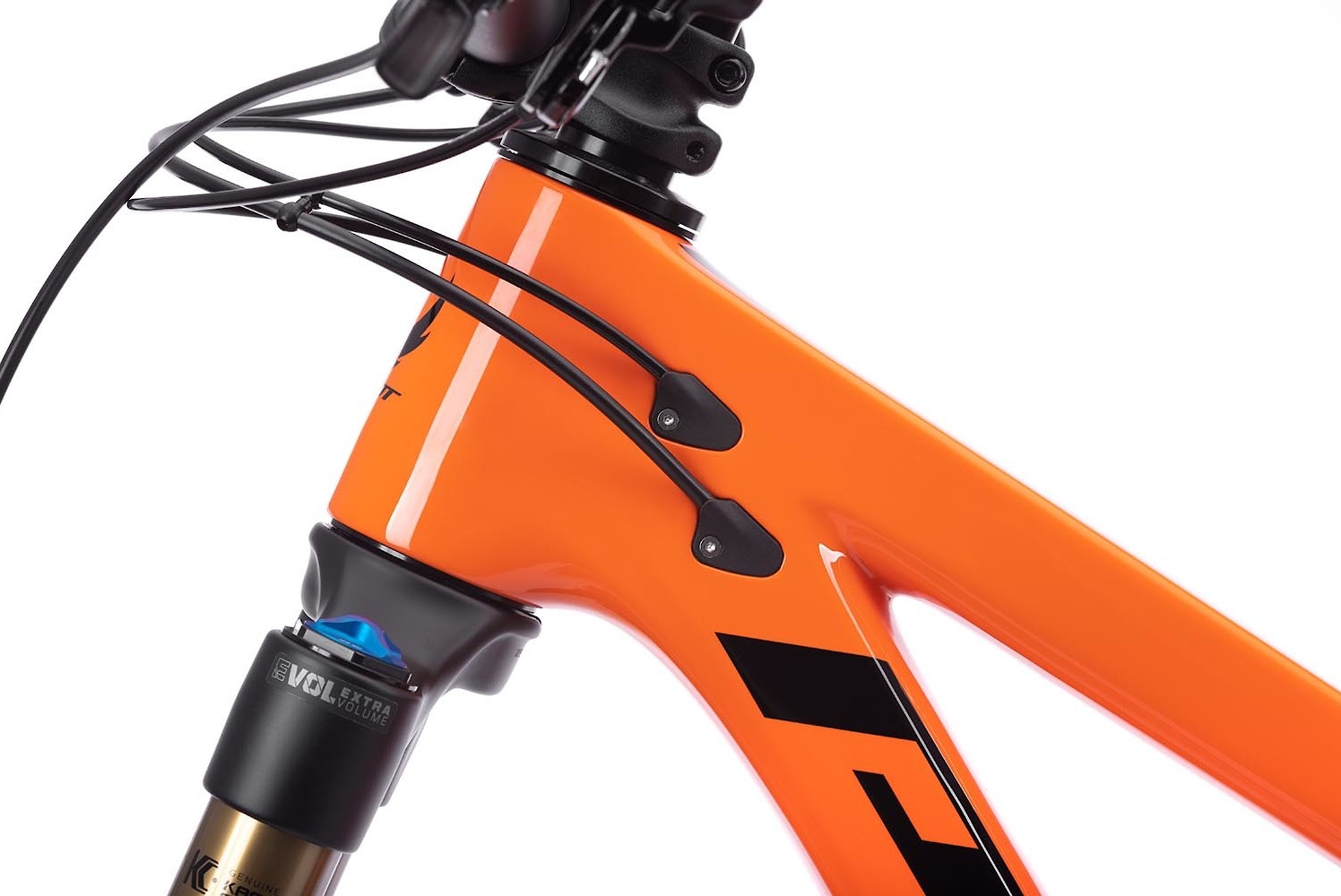





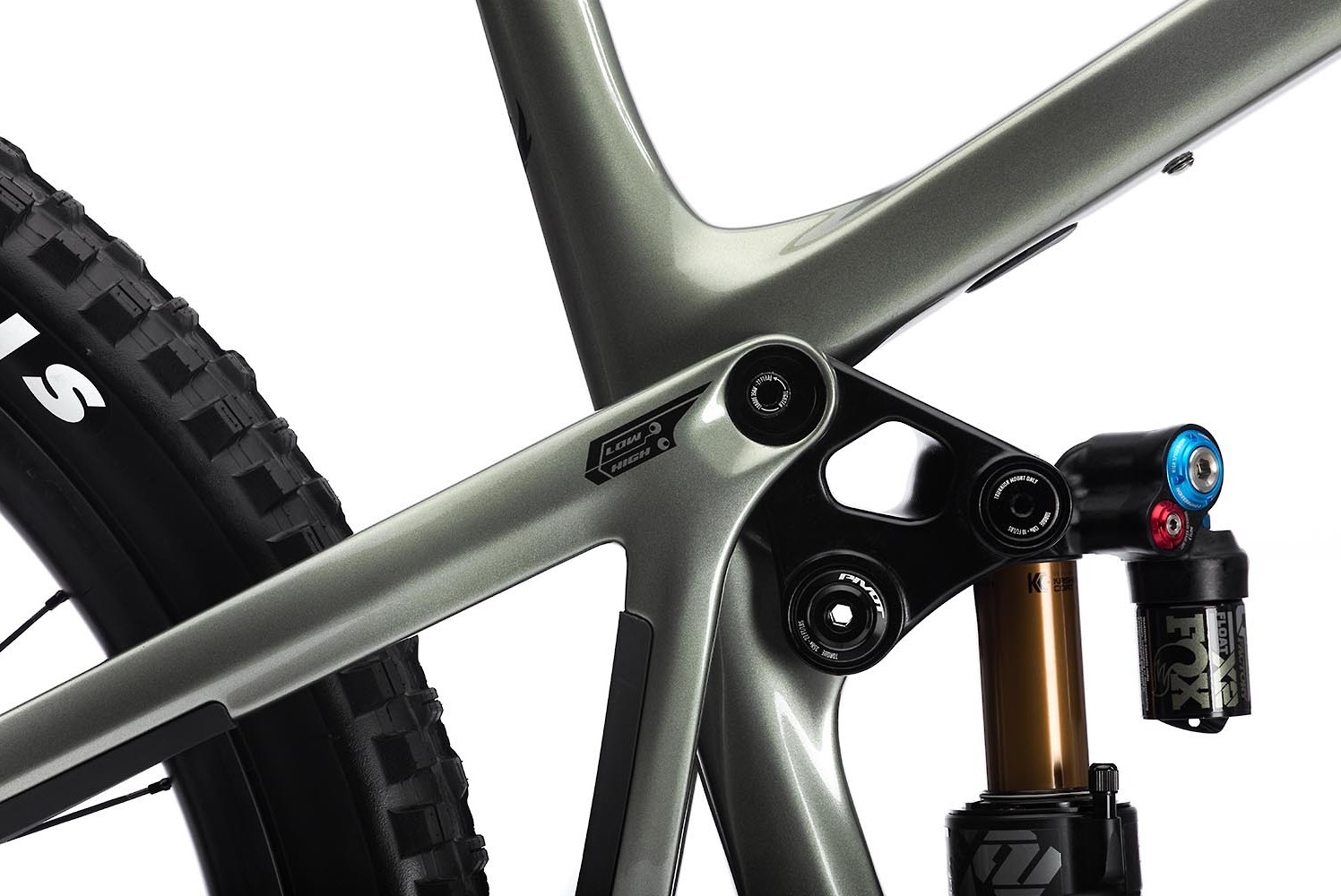







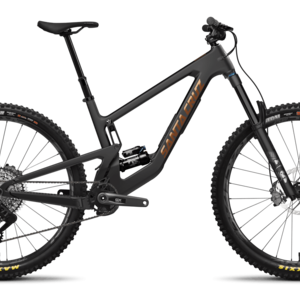
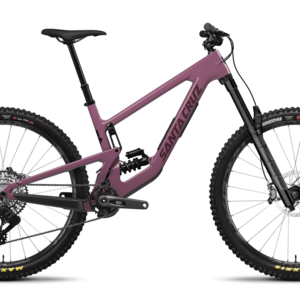
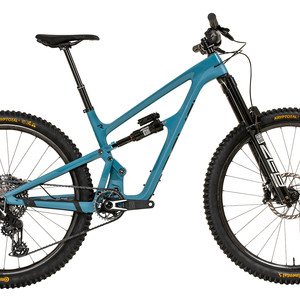

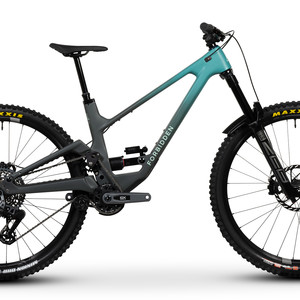
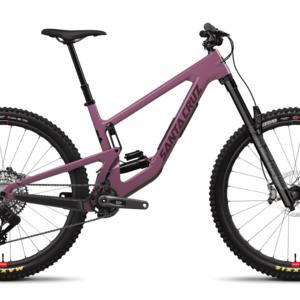







80 comments
Post a reply to: Vital Test Sessions - Pivot Firebird